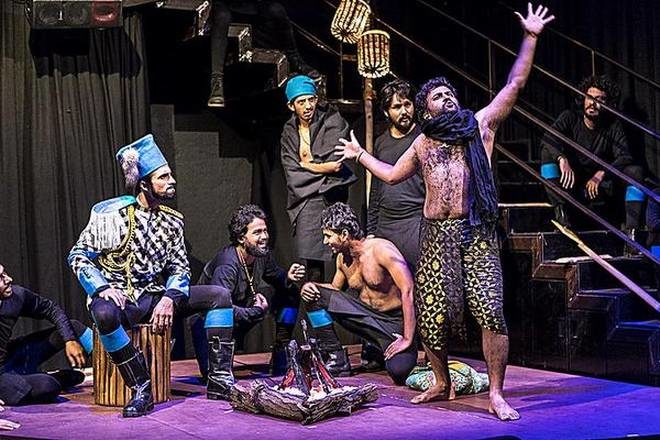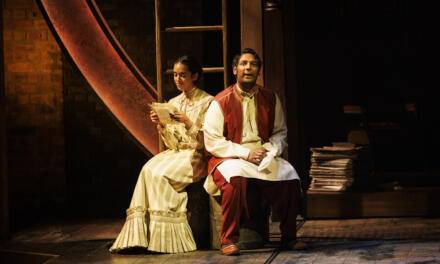Casting actors from outside the repertory means new energy and new audiences.
Last week, I watched a play set in Portugal, produced by a group from Pune, in which the protagonist was played by an actor from Jaipur. A few years ago I directed a play set in Baghdad and London, in which a few Iraqi insurgents were portrayed by actors from Bulandshahr, Cuttack, and Pune. One of the nicest plays I have seen about Kashmir was directed by a Bengali and featured an actor from Bengaluru. We ourselves have often cast actors from Pune and Bengaluru.
Increasing diversity
And I don’t mean people originally from these places now residing in Mumbai. I mean actors who travel from their hometowns for rehearsals and shows. Does this mean that there is a dearth of actors in Mumbai? Not at all.
So is the point I’m making about being inclusive? I don’t think so. I’m just fascinated by this process of expansion, this increasing diversity in collaborations. Something interesting is bound to come from various sensibilities and processes in one room.
The influx from Pune started in the last decade. I do believe that Thespo has had a big hand to play in this. Amey Wagh and Nipun Dharmadhikari, who are both Internet sensations and big stars in the Marathi film industry (Amey had a terrific year having acted in Muramba and Faster Fene, and Nipun’s directorial debut Baapjanma got tonnes of critical acclaim), got exposure in Mumbai thanks to their award-winning plays in the aforementioned theatre festival.
It wasn’t long before they were being approached by theatre groups in Mumbai. Other prominent Marathi theatre people who have made waves in Mumbai productions include Abhay Mahajan, who trained from Attakkalari in Bengaluru and got very famous playing Mandal in TVF Pitchers; Mrinmayee Godbole, recently seen in Padman; Parna Pethe, daughter of respected theatre person Atul Pethe; Radhika Apte, who needs no introduction; Sagar Deshmukh, who has now travelled the world with Piya Behrupiya; Sarang Sathaye, who now runs a hugely successful Marathi YouTube channel called Bharatiya Digital Party; Sayalee Phatak, who won the Mahindra Excellence in Theatre Award (META) for NCPA’s production of A Friend’s Story, and Siddharth Menon, who is now one of the two actors playing Aladdin in Disney’s large-scale musical.
Mixing things up
The Jaipur phenomenon is more recent, and the onus lies on a wonderful couple who trained at NSD. Ajeet Singh Palawat and his wife Ipshita have their own theatre group in Jaipur called Ujaagar (members of which rush to your help when you have shows there), but having been picked up by Mohit Takalkar for a few of his productions, they have since moved to Mumbai, and are making a huge mark on the theatre scene here.
Ajeet won a special mention at META for his performance as a mentally challenged Palestinian man in the Hindustani adaptation of I Am Yusuf And This is My Brother, and then displayed tremendous range by playing a hilarious sardar in a web series called Boygiri.
Ipshita starred in that too, but recently knocked the socks off discerning viewers at the Prithvi Festival with her solo act in the very challenging play Mathemagician, again directed by Takalkar.
I had the good fortune of watching a farce with the Ujaagar actors, and I’m certainly planning on poaching a few of them.
Meanwhile, another NSD batchmate of theirs, Boloram Das from Assam, who has already proven his prowess as an actor in movies and web series, is reviving his theatre group and working on a new production. I’m excited.
Diversification is quickly becoming the name of the game. What’s interesting is that the original idea always was to build one’s own repertory. If not an official repertory, at least a regular group of actors and technicians, who work together out of a sense of comfort and loyalty. But, on the other hand, casting from outside your regular pool opens things up.
New people get a new energy, a new discipline, and most importantly, a new audience. Of late, I have consciously been mixing things up, throwing together old faithfuls with people we haven’t worked with before.
So far the results have been good, and more importantly, because we’re quite an accepting bunch, the theatre family has grown.
Akarsh Khurana is a theatre producer and director and hence often broke. To cope, he writes and directs films and web series and occasionally acts, albeit reluctantly.
This article originally appeared in The Hindu on March 24, 2018, and has been reposted with permission.
This post was written by the author in their personal capacity.The opinions expressed in this article are the author’s own and do not reflect the view of The Theatre Times, their staff or collaborators.
This post was written by Akarsh Khurana.
The views expressed here belong to the author and do not necessarily reflect our views and opinions.


















